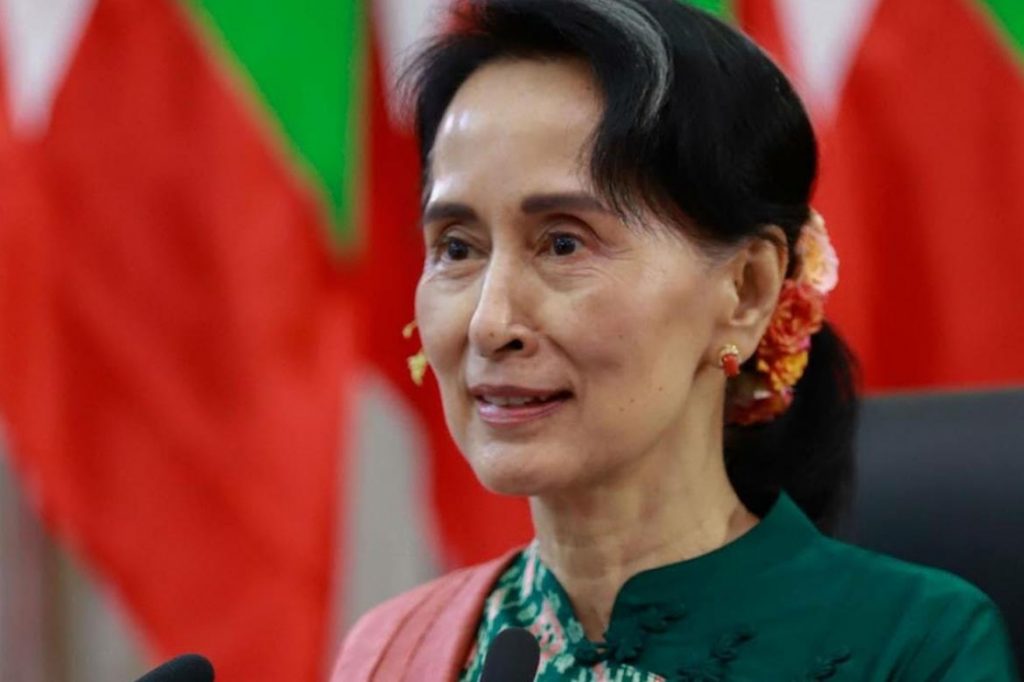By SEAN GLEESON | FRONTIER
YANGON — Daw Aung San Suu Kyi says repatriation and resettlement of the more than half a million Rohingya refugees who have crossed over into Bangladesh is a top priority for her government and is urging the public to support efforts to resolve the humanitarian crisis in northern Rakhine State.
In a nationally televised address Thursday evening, the state counsellor said Myanmar would overcome any difficulties the country faced through “the unity of our people”. The government would respond to international outrage over the latest military crackdown in Rakhine State through its “actions and deeds” in facilitating the return of those that fled over the last six weeks.
Returning to a theme from her first address on the crisis in September, Aung San Suu Kyi acknowledged the criticism of her government’s handling of the crisis from foreign media outlets and Western governments, while arguing that her government understood the nature of the refugee exodus better than the international community.
“There has been a lot of criticisms against our country,” she said. “We need to understand international opinion. However, just as no one can fully understand the situation of our country the way we do, no one can desire peace and development for our country more than us. That is why we need to tackle these problems based on the strength of our unity.”
Support more independent journalism like this. Sign up to be a Frontier member.
Aung San Suu Kyi also announced the formation of a new committee, the Union Enterprise for Humanitarian Assistance, Resettlement and Development in Rakhine, to lead the government’s efforts. She will chair the committee, while Union Minister for Social Welfare, Relief and Resettlement Dr Win Myat Aye will be deputy chair.
Win Myat Aye is also leading a separate committee focused on implementing the recommendations of the Advisory Commission on Rakhine State, the body led by former UN secretary-general Dr Kofi Annan to recommend long-term solutions to communal tensions and development programmes in Rakhine State. The state counsellor promised Thursday that her government would “implement the short and long term tasks” of the Annan report effectively.
Annan is briefing the UN Security Council in New York later on Friday to discuss the plight of the Rohingya community in Rakhine State. Previous discussions in the council have condemned the latest crackdown in northern Rakhine, but opposition from China and Russia has prevented any response beyond a formal rebuke of Myanmar’s government and armed forces.
Foreign governments and the United Nations have expressed scepticism that Myanmar would be able to facilitate the return of refugees.
A Wednesday report by the UN Office of the High Commissioner for Human Rights said the military crackdown in response to the August 25 militant attacks on security posts showed a high degree of organisation and coordination, with the apparent intention of permanently driving the Muslim population from the area.
“The destruction by the Tatmadaw of houses, fields, food-stocks, crops, livestock and even trees, render the possibility of the Rohingya returning to normal lives and livelihoods in the future in northern Rakhine almost impossible,” the report said.
“Information received also indicates that the Myanmar security forces targeted teachers, the cultural and religious leadership, and other people of influence in the Rohingya community in an effort to diminish Rohingya history, culture and knowledge.”
Meanwhile, the military has opposed any efforts to implement the Annan Commission’s recommendations and has signalled its opposition to the return of Rohingya refugees.
In a Facebook post yesterday, Tatmadaw chief Senior General Min Aung Hlaing blamed “instigation and propaganda” by foreign media for having “exaggerated” the number of refugees to flee to Bangladesh, adding that the Rohingya belonged in Bengal.
At the end of her address, Aung San Suu Kyi said that state-run media outlets would publish information on how the Myanmar public and foreign supporters could assist the government’s efforts to bring peace and development to Rakhine State.







